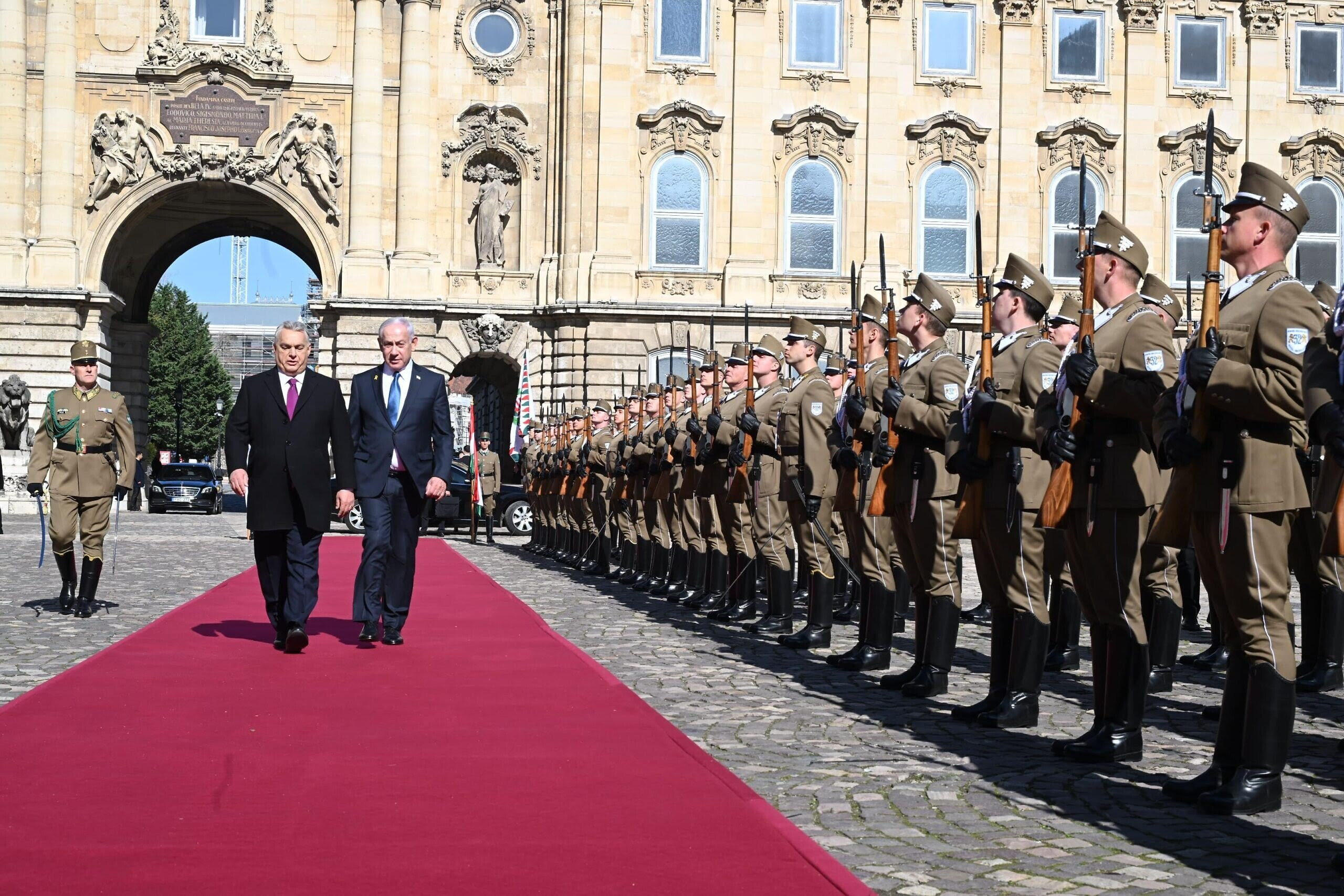Balázs Orbán, Hungary’s lead political adviser, told JNS that Budapest and Jerusalem are fighting back against globalist “neoliberal values” and countering with an “era of sovereignty.”
Alex Traiman
(JNS)
Hungary is quickly turning into Israel’s most important ally, and one of the most consequential countries in Europe. The Eastern European nation is home to Israel’s third-largest Jewish community and is among the most popular vacation destinations for Israelis.
Common policies, which begin with standing firmly against Jew-hatred, are at the heart of the alliance, and the same political forces—the progressive left and radicalized Muslims—that have sought to prevent the Jewish state from emerging as a strong sovereign nation are attempting to do the same to Hungary.
In their efforts to strengthen their respective nations, Israeli Prime Minister Benjamin Netanyahu and Viktor Orbán, the Hungarian prime minister, have found common ground and formed a strong working alliance, evidenced by the royal greeting Netanyahu received in Budapest last week.
Since the International Criminal Court, a stand-alone judicial body in The Hague which is not connected to the United Nations, issued an arrest warrant for Netanyahu on faulty war crimes charges in February, the Israeli premier cannot touch down securely throughout much of Europe. But not only did Orbán welcome Netanyahu with open arms. He formally withdrew Hungary from the ICC and said that the once “important court” has become a political tool, as so many international bodies have.
“If you look around and see the international organizations U.N., EU and Council of Europe and then some of the organizations, they’re getting more and more involved in politics in a bad way, political ideology in a bad way,” said Balázs Orbán, the Hungarian government’s political director and chief domestic and foreign policy advisor to Viktor Orbán. “Unfortunately it became obvious for us that the same happened with the ICC in the last years.”
Orbán shares a last name and common political philosophy with the much older prime minister, but the two are not related. The political adviser, 39, is a rising political star in Hungary and in conservative political circles worldwide.
“If you are dealing with a biased, politically motivated international court, which is affecting your sovereignty and it’s making peace harder in the Middle East, this is not something Hungary should belong to,” Orbán told JNS. “This is why we decided to leave.”
“We need international structures, but international structures which are not biased or based on woke ideology, but which are neutral,” he said.
Orbán explained that Hungary has sought a role as an international peace maker, recently proposing to help immediately end the war between Russia and Ukraine. On a peace seeking mission that included stops in Kiev, Moscow, Beijing and Washington, Hungary determined that both primary parties to the conflict, Russia and Ukraine, are committed to fighting.
“They don’t want to close the conflict,” Orbán said. “So we need mediators and we need diplomats who are doing their part of the job.”
“All these globalist international organizations are utilizing a progressive toolkit to promote their own ideology,” he added. “I think it’s very bad for all nation states.”

Because of that “destabilizing agenda,” the world is currently dealing with “an era which is full of conflicts,” he said. “It’s very hard to manage it. It’s very hard to avoid a war.”
Hungary would like to see peace emerge in the Middle East as well. “We were horrified when we saw the terror attacks against Israel,” Orbán told JNS. “We think that Israel has a right to defend itself.”
“Israel’s stability is important for the stability of the Middle East, and all countries need to work together with Israel to stabilize the Middle East,” he said. “How do you want to do that if you have a warrant against the acting prime minister, who is supported by the Israeli people? It makes no sense. International courts shouldn’t intervene based on a clear political motivation.”
Hungary began to improve relations when it was faced with its own domestic challenge of dealing with a movement of immigrants from the Middle East. Led at the time by Brussels and Berlin, Western Europe wanted all European nations to absorb an influx of Muslim immigrants from the Middle East.
Hungary understood that the proposed policy threatened to turn a proud nation with a unique history and cultural character into an annex of the societies from which they were fleeing.
With Hungary facing this growing strategic threat, “the prime minister decided that safety and security and strategy cooperation with Israel was very important,” Orbán told JNS.
Protecting Hungary’s large Jewish community became paramount, unlike failed efforts in cities like Paris, London and Brussels.
Orbán explained that the relationship between Hungary and Israel centers on three main pillars. First, “there is a general approach in Hungary which means zero tolerance on antisemitism, and it’s based on the idea that all Hungarian citizens should be protected.”
The second issue is migration. “We learned the lesson that this is a serious issue,” Orbán said.
The third pillar is a deep “strategic partnership between the two countries based on the friendship of the two leaders,” he said. “They know each other. They trust each other, so this is how you develop international, good international relations and this is what is happening between two countries.”
Over the past decade, Hungary has pushed back hard against the European Union and rejected calls for the mostly-Christian country to open its borders to millions of Muslim migrants. It has done so at great cost to its economy, in the form of EU sanctions.
“Hungary has to pay, every day, 1 million Euro because we don’t let the illegal migrants in, but it’s money which is worth it to spend,” Orbán said. “It is outrageous that we are under sanctions because of this.”
He pledged that Hungary will recoup those lost funds. “If you let those people in, the social costs and the financial costs would be much higher than 1 million euro per day,” he said.
The decision was not an autocratic policy. Hungary put the issue of Muslim migration to a national referendum to give citizens a role in the decision making. “This is why we Hungarians are very tough on that, and we have a zero illegal migration policy,” Orbán said.
“In this modern era in Europe, you want to fight against antisemitism. It would mean a very tough fight against illegal migration,” Orbán told JNS.

The European Union has been promoting what Orbán refers to as a “neoliberal agenda” of pan-continentalism over strong nationalism, and the United Nations and other international institutions have been pushing a world order, in which national ambitions were meant to take a back seat.
“Look at the European Union. Look at Brussels. They isolated themselves from the Russians and cut energy cooperation, which caused serious harm for the European economy and competitiveness,” he said. “They started a trade war against China, which is the biggest market for many companies and based on ideological differences.”
He added the bloc similarly chose to isolate itself from the Trump administration.
“Hungary wants to go the other way around,” Orbán said. “We are a member of the European Union, but we maintain a relationship with Russia. We have a strategic partnership with China. We have a strategic partnership with the United of America, and we are looking for opportunities based on our own national interest.”
Noting that conservative ideology is making a strong comeback across Europe, Orbán said that “everybody respects sovereign countries, strong leadership, and everybody sees that the new world order has come.”
“We have to figure out the new rules, because the old rules are not working anymore,” he said.
Orbán added that the neoliberal push was not coming only from the European Union or international agencies like the United Nations and the International Criminal Court. Hungary did not have strong relations with the previous U.S. administration, under President Joe Biden, he said.
Hungary is also prioritizing the traditional family unit, according to Orbán.
The Biden administration was “promoting gender issues, which is kind of an anti-traditional family issue, so if somebody wants to promote an ideology which is against traditional way of life and traditional families, and having as many children as we can have, this is problematic,” he said.
Over time, “it will cause the decay or the decline of the society,” Orbán said.
Worse, the Biden administration and the billionaire George Soros support Hungary’s political opposition—similar to a problem that Netanyahu has contended with in Israel—according to Orbán.
“Many opposition media, many opposition politicians, and actually the campaign of the latest opposition ‘united front’ was financed by American taxpayers money,” he said. He added that such financing “is undermining the legitimacy and the credibility of the United States.”
“I’m not the one who should talk from an American taxpayer position but as an outsider, I can see why they are so frustrated, because your American taxpayer money is used by the government” to “spread this progressive, Open Society ideology all over the world,” he said. “I think it’s the biggest corruption scandal of the world.”
“If Hungarian politics is financed out by a foreign country, I think it’s unacceptable,” he said. “It doesn’t matter whether it’s financed from China, the United States, or Austria or Germany.”

“I think it’s unacceptable and I think that it would also be unacceptable for you as well in Israel,” he said. “Israeli politics should be financed by the Israelis from Israel, not from outside.”
Hungary has much closer ties to the Trump administration and Orbán is not shy about showing how satisfied he is that U.S. President Donald Trump won, noting that his boss had openly predicted the president would be reelected.
“We are very thankful and I think it was a very good decision from the United States point of view to try to get rid of these corrupt structures,” he said. “We want to catch up, because now it’s time to act against these media outlets and NGOs and politicians. It’s again, a sovereignty issue for us.”
Orbán is afraid that with the Trump administration now opposing the neoliberal ideology, the push will be made even more powerfully from Europe.
“We have one fear that we see that since the liberals and the progressive positions are weakening in Washington, they will try to move to Brussels and they will try to use the European taxpayer money and use the European institutions to get new resources and to find new so-called donors and to increase their activities here in the continent,” he said.
Hungary’s policies have aroused the ire of progressives, but conservatives across Europe have taken notice and are following Hungary’s lead.
Miklós Szánthó, the director general of the country’s Center for Fundamental Rights, told JNS Hungary’s conservative resurgence responds to what conservatives realized internationally, “not only in Israel or in Hungary, but western in Europe, in the United States and in South America as well.” Conservatives worldwide understood that there was a progressive war “against our fundamental values of God, home and family.”
Europe is engaged in a deep “ideological clash,” according to Szánthó.
“Hungary is protecting its borders and it’s protecting its sovereignty and national identity,” he said. “But Western Europe, at least the urbanized regions of Western Europe, are lost. That is for sure.”
Szánthó said that the ideological battle is “the globalists versus the sovereigns.”
To push their ideological agenda, the globalists attempt to “destabilize the country’s social stability and undermine the state’s sovereignty. They try to remove stable, conservative, right-wing governments with foreign aid,” he said. “Those liberal practices I think are the same in Israel. In Hungary, in Western Europe, in the United States, globalists go on a political witch hunt to get their way, and they use lawfare against Trump, against Orbán, against France’s Le Pen, against Netanyahu. Those practices are the same.” (Marine Le Pen is a French politician.)
The so-called sovereigns are fighting back, according to Szánthó. “I would call it an international conservative renaissance or international conservative counter revolution of the common sense,” he said.
“I think that Israeli conservatives should play a leading role, because you are engaged in the same fight for the very same Judeo-Christian values of our civilization,” he said.
Orbán believes that both Netanyahu and the Hungarian prime minister are critical players in reshaping global politics.
“We see that we are entering in an era of—it’s a new world order,” Orbán told JNS.
The Hungarian political adviser referred to the movement as an “era of sovereignty,” in which countries can thrive by implementing unique political and economic systems and having the strong capability of “defending their own sovereignty.”
“What we see now is that a new kind of equilibrium is starting to emerge,” Orbán said. “It’s obvious that these neoliberal principles failed. They’re not working anymore, and the power balance inside the world has changed.”
Countries are beginning to shift back to their original “political structures, different economic structures and different civilizational backgrounds,” he said.
Published on Sun, 06 Apr 2025 17:32:32 -0400. Original article link


